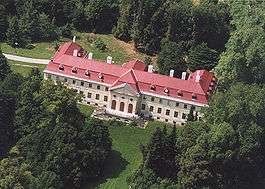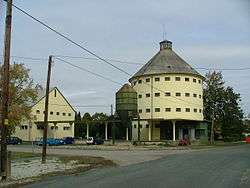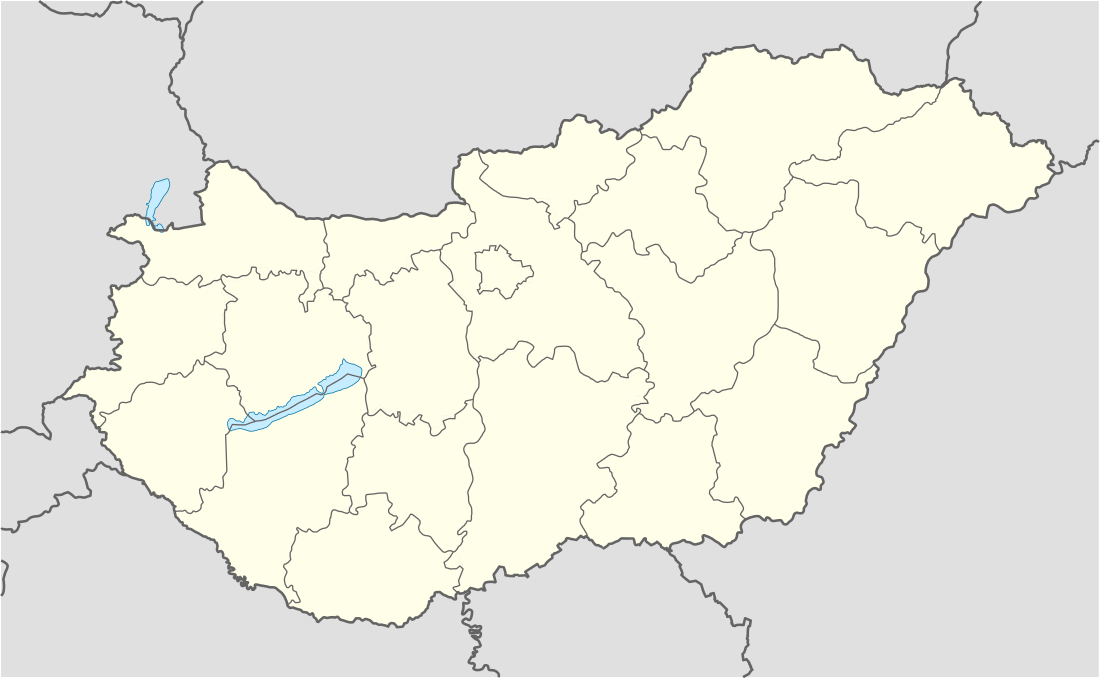Sopronhorpács
Sopronhorpács is a village in Győr-Moson-Sopron County in Hungary.

Széchenyi-casttle
Sopronhorpács | |
|---|---|
 | |
 Flag  Coat of arms | |
 Sopronhorpács Location of Sopronhorpács in Hungary | |
| Coordinates: 47.48351°N 16.73821°E | |
| Country | Hungary |
| Region | Western Transdanubia |
| County | Győr-Moson-Sopron |
| Subregion | Sopron–Fertődi |
| Rank | Village |
| Government | |
| • Mayor | Talabér Jenő |
| Area | |
| • Total | 20.69 km2 (7.99 sq mi) |
| Population (1 January 2008)[2] | |
| • Total | 842 |
| • Density | 41/km2 (110/sq mi) |
| Time zone | UTC+1 (CET) |
| • Summer (DST) | UTC+2 (CEST) |
| Postal code | 9463 |
| Area code | +36 99 |
| KSH code | 29090[1] |
| Website | www.sopronhorpacs.hu |
Sightseeings
Parochial church
- The parochial church of the village was built in the 12th century in Romanesque style. Its beautiful western doorway was built around 1230 together with the southern nave.
The baroque towers were built in the 18th century.
Széchenyi castle
It was built by the widow of Zsigmond Széchenyi between 1771 and 1774 között. It was rebuilt by Count Ferenc Széchényi, who also extended it with a library. It was later renewed in baroque style. In this castle the famous Hungarian composer Ferenc Liszt pianist played sometimes.
gollark: Not really.
gollark: I think you should probably be able to? In fact, you shouldn't without someone opting *in*.
gollark: Given your descent into evil.
gollark: I mean, you don't seem to accept anything but a demonstration of how it's better for you if you don't.
gollark: What sort of justification do you *want*?
References
- Sopronhorpács at the Hungarian Central Statistical Office (Hungarian).
- Sopronhorpács at the Hungarian Central Statistical Office (Hungarian). 1 January 2008
- Győr-Moson-Sopron megye kézikönyvéből (Szekszárd, 1998) Torma Margit irásának átdolgozásával.
- Szőnyi O. (É.n.): Régi magyar templomok. Alte Ungarische Kirchen. Anciennes églises Hongroises. Hungarian Churches of Yore. A Műemlékek Országos Bizottsága. Mirályi Magyar Egyetemi Nyomda, Budapest.
- Gerevich Tibor: Magyarország románkori emlékei. (Die romanische Denkmäler Ungarns.) Egyetemi nyomda. Budapest, 1938. 843 p. --- 32-33. p., LXXXVI. tábla bal alsó kép.
- Henszlmann, I. (1876): Magyarország ó-keresztyén, román és átmeneti stylü mű-emlékeinek rövid ismertetése, (Old-Christian, Romanesque and Transitional Style Architecture in Hungary). Királyi Magyar Egyetemi Nyomda, Budapest
External links
This article is issued from Wikipedia. The text is licensed under Creative Commons - Attribution - Sharealike. Additional terms may apply for the media files.